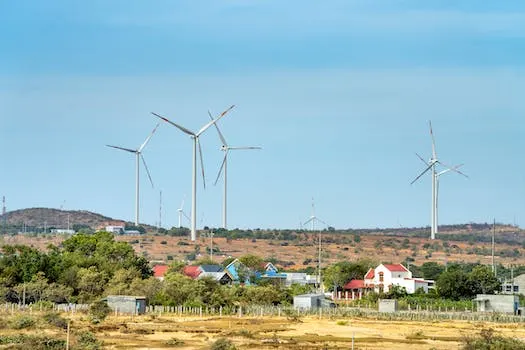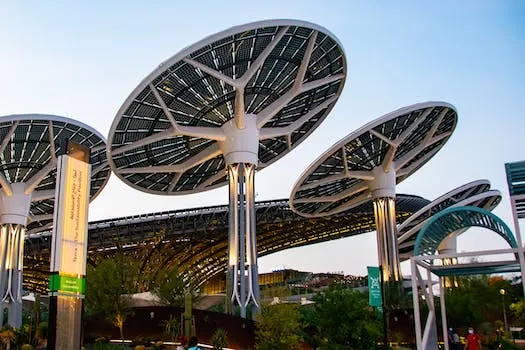
Understanding the Ecological Footprint of Businesses
Businesses have an ecological footprint just like individuals, and it’s important to understand the impact that businesses have on the environment. From the way they manufacture products to the type of energy they use, businesses can have a huge effect on our planet. The Ecological Footprint measures how fast we consume resources and generate waste compared to how fast nature can absorb our waste and generate resources. Companies use huge amounts of our planet's resources, resulting in a large corporate footprint that affects climate change. Human industry is a big part of this picture due to its reliance on land, resources, fossil fuels, and non-stop production and consumption.
If you're looking for ways to reduce your business' ecological footprint while still maintaining profitability, there are several options available. One way is by measuring your carbon footprint so you can identify areas where you can make changes or improvements in order to reduce your environmental impact. Additionally, eco-friendly brands are becoming increasingly popular as consumers become more aware of their own environmental impact; these companies are helping the environment by using sustainable practices such as sourcing materials responsibly or using renewable energy sources for production processes. Finally, investing in green technology such as solar panels or wind turbines is another great way for businesses to reduce their ecological footprints while also saving money in the long run through reduced energy costs.
Understanding your business' ecological footprint is essential if you want to make sure that it has minimal negative impacts on our planet's environment; with careful planning and implementation of sustainable practices you can ensure that your company remains profitable while also reducing its environmental impact significantly!
What is an Ecological Footprint?
Understanding the Ecological Footprint of businesses is essential to understanding how much of the environment is used to produce goods and services. The ecological footprint (EF) is a measure of the area of biologically productive land and water that is required for an individual or an activity to produce all the resources it needs, including plant-based food and energy. This measurement takes into account not only the resources needed for production, but also those needed to “assimilate” or clean up waste. The EF can be broken down into categories such as energy, transportation, water, materials and waste, built-up land, and food. This model helps estimate human population demands on the environment while taking into account limitations and benefits associated with these demands. As world population continues to grow beyond 7.9 billion people today, understanding our collective ecological footprint becomes increasingly important in order to ensure sustainable development in future generations.
How Can Businesses Reduce Their Ecological Footprint?
Businesses can reduce their ecological footprint in a variety of ways. Switching to renewable energy sources such as solar, wind, and hydro is one of the most effective methods. This not only helps reduce carbon emissions but also saves money in the long run. Additionally, businesses should invest in energy-efficient equipment and appliances to further reduce their energy consumption. Furthermore, businesses should strive to reuse and recycle materials whenever possible to minimize waste production. Sustainable materials and production processes are also important for reducing environmental impacts. Buying local products can help reduce transportation costs associated with shipping goods from far away locations. Companies can also encourage employees to work from home or use public transportation when commuting instead of driving cars which will help lower carbon emissions from air travel and commuting. Finally, companies should remember the three R's: Reduce, Reuse, Recycle; purchase carbon offsets; invest in renewable energy; use green refrigerants; caulk insulation and weather stripping for sealing windows; install motion sensors for lights; replace old equipment with more efficient models; buy recycled paper products etc., all these measures will help them significantly reduce their ecological footprint while saving money at the same time!
The Benefits of Reducing Your Ecological Footprint
Reducing your ecological footprint has many benefits for both the environment and businesses. By reducing resource consumption, businesses can save costs and increase efficiency and productivity. This helps to improve air and water quality, reduce greenhouse gas emissions, and enhance public image. Additionally, reducing resource consumption helps to conserve resources, reduce pollution, prevent the need to harvest new raw materials, reduce carbon footprints that have huge impacts on environmental health, economic health and public health. There are many ways to do this such as reducing energy consumption with easy tricks like turning off lights when not in use or unplugging electronics when not in use. The Ecological Footprint measures how fast we consume resources compared to how fast nature can absorb our waste and generate resources which is why it is important for businesses to be mindful of their ecological footprint in order to ensure sustainability efforts are successful.
Conclusion
Businesses have a responsibility to reduce their ecological footprint in order to protect the environment and benefit their business. By implementing energy-efficient equipment, switching to renewable energy sources, reducing waste, and using sustainable materials, businesses can reduce their carbon footprint while also reaping the benefits of doing so. energy efficiency measures are an important part of any business’s sustainability efforts as they help save money by using less energy while simultaneously reducing emissions. Additionally, businesses should be aware of the effects that climate change has on our planet and take steps to lessen their impact on it. Reducing energy use is essential in this fight against climate change as traditional power plants burn fossil fuels that release greenhouse gases into the atmosphere. Businesses must understand these issues and take actionable steps towards reducing their ecological footprint for a more sustainable future.










